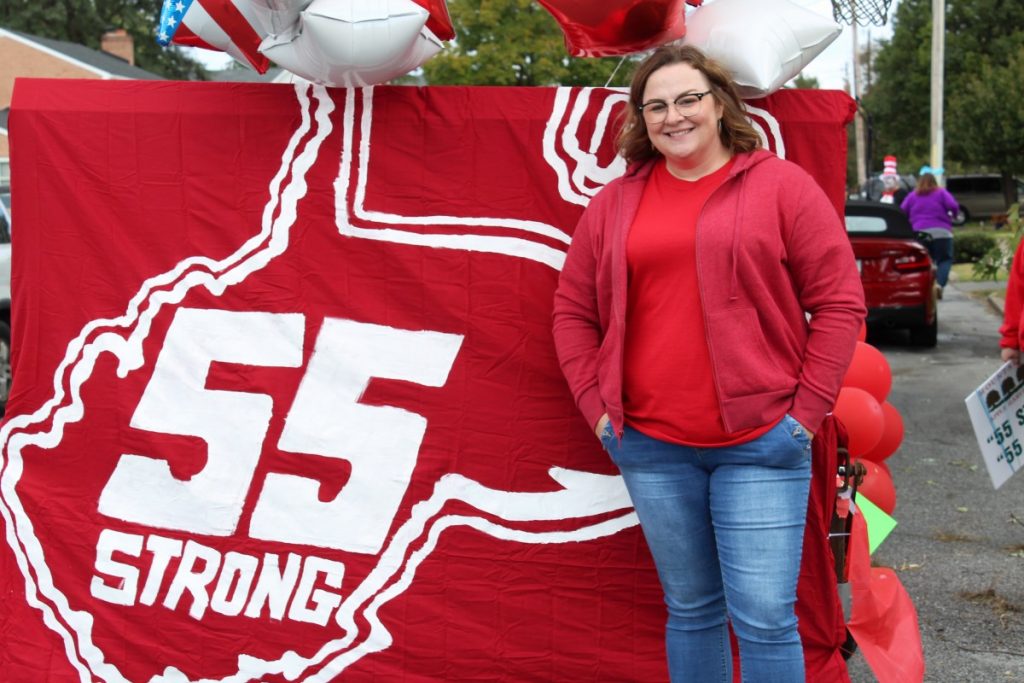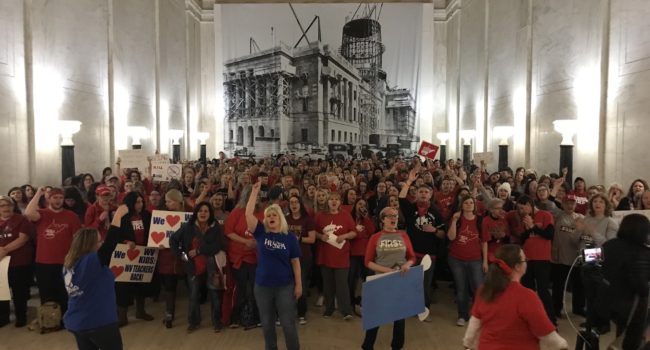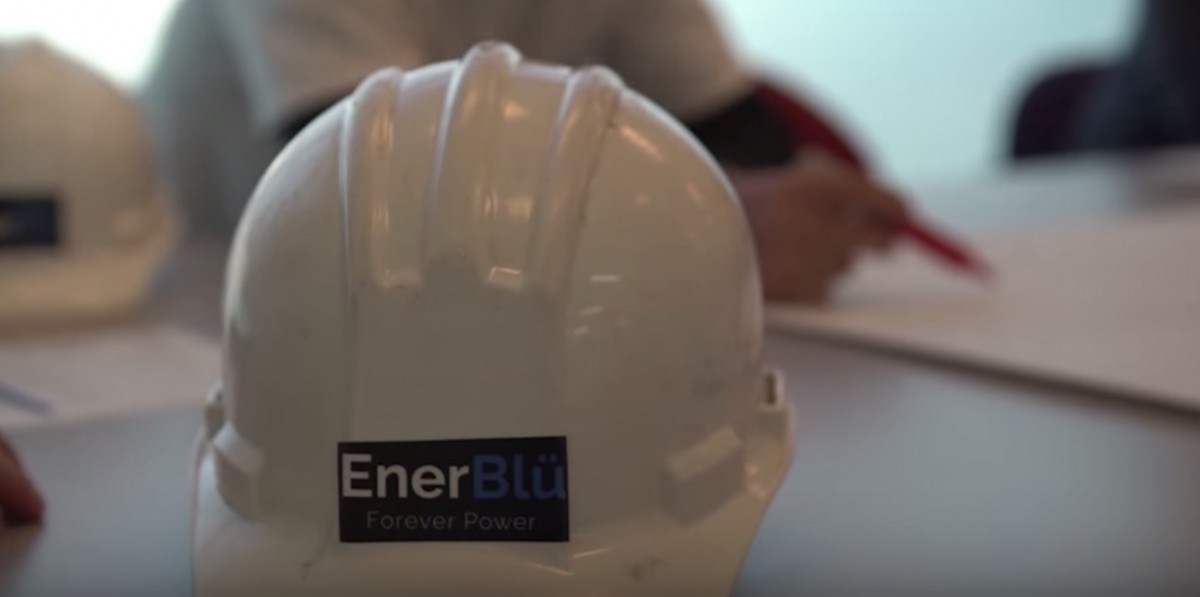My great-grandfather was a coal miner.
He dropped out of school to mine coal at age 14, and he supported his family with his wages from the mines and what he could grow on the small farm I would one day grow up on. And while he never regretted his decision to go into the mines–he famously said he liked the hard work–he knew that for his children and grandchildren, education was the path forward.
My great-grandfather used his wages from the mines to buy playground equipment for the one room school my grandfather attended, and when my grandfather and his sisters were high school age, my great-grandfather led a local movement to petition the school board to send busses to his small mountain community in North Central West Virginia so his own kids could be transported to the local public high school.
My grandfather and his sisters all went on to graduate from high school, attend college and work in education. I have often wondered if that would have been the case if my great-grandfather hadn’t fought to get that school bus up our mountain. My grandfather went on to be a celebrated teacher and coach in Barbour County, West Virginia, and three of his own children, my mother included, carried on this family tradition of working in public education.
I have been an English teacher in Berkeley County, West Virginia, for the last 15 years, but I have spent my life in conversations about public education in this state, and I know now what my great-grandfather knew over 75 years ago when he petitioned the school board to provide busses to that small, mountain community: that our path forward in this state is to make sure every student has access to quality, public education. Strong schools and educational opportunities build strong communities.

The problem is, in recent years in West Virginia, teachers have been fighting an uphill battle to create those strong schools. Public education funding is scarce, teacher pay in West Virginia is among the lowest in the nation and last year increasing insurance premiums and skyrocketing deductibles were going to mean that many educators across the state were going to experience a loss in pay. It was too much.
Teachers in this state have consistently been asked to turn two fishes and five loaves into enough to feed thousands. We have worked on the front lines of poverty and opioid epidemics with not enough books and supplies, sometimes not enough heat in our schools, not enough time to plan and collaborate and still we have worked miracles. The innovation and successes in our schools have happened despite the West Virginia state government.
But in February 2018, those sacrifices were being overlooked. So, I along with 20,000 teachers and school service personnel across this great state walked off the job. That work action lasted nine emotionally charged days, and, for many of us, it was not a fight about salary, but about respect. It was fight about health care and what we value as public educators. It was fight about what we want for our schools and our state. It was a fight for the soul of West Virginia.
We returned from the picket lines and the halls of the West Virginia Capitol to our classrooms with a 5 percent pay raise and a promise to find a dedicated revenue source for PEIA, the state’s Public Employee Insurance program.I never imagined after I returned to my classroom last March that I would walk out of it again so soon.
But as the months ticked by and I watched the PEIA Taskforce spin its wheels trying to fix the funding problems of our health insurance system, I could feel the collective frustration of public employees growing. I attended and spoke at public hearings on PEIA. I watched an educational revolution of teacher strikes sweep the nation, and I wondered how our Legislature would address our concerns in 2019, concerns over health care and education reform.
The first major piece of education legislation to be presented in the 2019 session was Senate Bill 451, a massive “omnibus” bill that did include another pay raise and additional funding for PEIA, but also damaging measures to privatize public education in West Virginia. It was clear this bill was retaliatory in measure. It was a complete overhaul of our education system — one that had been written without the input of a single teacher or school administrator. In fact, most of the language appeared to be lifted from the ALEC website, the American Legislative Exchange Council, a conservative bill factory responsible for legislation like Florida’s “stand your ground” law. To add insult to injury, these damaging measures were wrapped up in words like “empowerment” and “reform.”
Proponents of this bill claimed these initiatives — the dismantling of public education and the creation of charter schools and Education Savings Accounts– were about “choice” and creating competition for our public schools. I listened while elected officials gave speeches on the Senate floor and called West Virginia public education “failing” and compared the great work of my life to a “fatal disease.”
For many educators, the implication that any struggle or inadequacies our schools or students might be experiencing is simply because we don’t have enough “competition” is frankly insulting. Teachers do the work they do because they are called to it. And if our legislators truly wanted to know how to fix a struggling school, the educators in them could tell you.
But it soon became clear that teacher voices would not be valued in this conversation about education.
I watched as for-profit charter school lobbyists were given endless time to present to the House Education Committee. A public hearing was scheduled and I drove 300 miles to the state capital to speak only to have my mic cut off at exactly 70 seconds. That was the time I was allotted. But later that day, school choice lobbyists were once again given endless time to speak to the Senate Education Committee.
This bill was not really about reform. It was about finding a way to use education to line the pockets of out-of-state corporate interests. There is a long history of folks coming to Appalachia and taking. They’ve taken our coal and our timber and left us with flat mountain tops and polluted water. And now, those out-of-state corporate interests have looked around and the only thing left to take? Our education system.
And this isn’t just happening in West Virginia. It’s happening across our country. Teachers in Denver went on strike for the first time in 25 years, ending last week after three days on the picket lines urging officials to pay them a fair wage. Los Angeles Unified Public schools just last month ended a nine day strike, instating a moratorium on the creation of any new charter schools because of teachers’ demands for a better system for their students, a system that protects them from the interests of for-profit schools.

The idea that education should and can be run by business should terrify us all. Because we aren’t dealing with products, we’re dealing with children. All over this country charters schools have closed suddenly — some mid-year — because they were “underperforming.” This is the danger of having a “CEO” instead of a principal or a teacher: the bottom line is not the wellbeing of our students or communities, but profit margins and success rate. And as I heard one brave West Virginia student put it at the public hearing on West Virginia’s “omnibus reform” bill: when you say schools should compete, you are saying that some schools should win and others should lose.
Teachers in West Virginia are not against reform. In fact, we’ve been advocating for it for years. But real reform doesn’t look like a for-profit education system. It looks like funding for professional development and time to plan and collaborate. It looks like more school counselors and nurses. It looks like funding for programs to combat our opioid epidemic and mental health crisis. It looks like competitive salaries and adequate health care. It looks like the recruitment of teachers of color and the expansion of teacher education programs.
But this bill was not really about reform. It was about retaliation.
So for the second time in two years, West Virginia teachers, bus drivers, and school service personnel walked off the job. It’s been scarier the second time around. No one was sure if the public support would be as strong this time, especially since the fight is so much more nuanced. We were battling a bill that included a pay raise after all. But if our state government wants to give us 30 pieces of silver in exchange for the dismantling of public education in West Virginia, then they can keep it. And perhaps they will.
The battle to protect our state’s public education system from the outside interests that are attempting to “reform” it isn’t over. Teachers and bus drivers, counselors and nurses will return to their workplaces in West Virginia Thursday with the hope that our lawmakers won’t attempt to revive a proposal that sells our public education system to the highest bidder.
It’s what my great-grandfather — a coal miner with no high school education — knew when he stood before the local board of education and demanded school busses for his mountain community. Education should not be politicized or partisan. It shouldn’t be about profits. It should be about building stronger communities and about making sure that all our children, not just a select few, are getting the quality education they deserve.
Jessica Salfia, co-editor of the book “55 Strong: Inside the West Virginia Teachers’ Strike,” is a writer, activist and teacher at Spring Mills High School in Martinsburg, West Virginia. Her writing has appeared in the Anthology of Appalachian Writers, the Charleston Gazette-Mail and WVCTE Blog.



